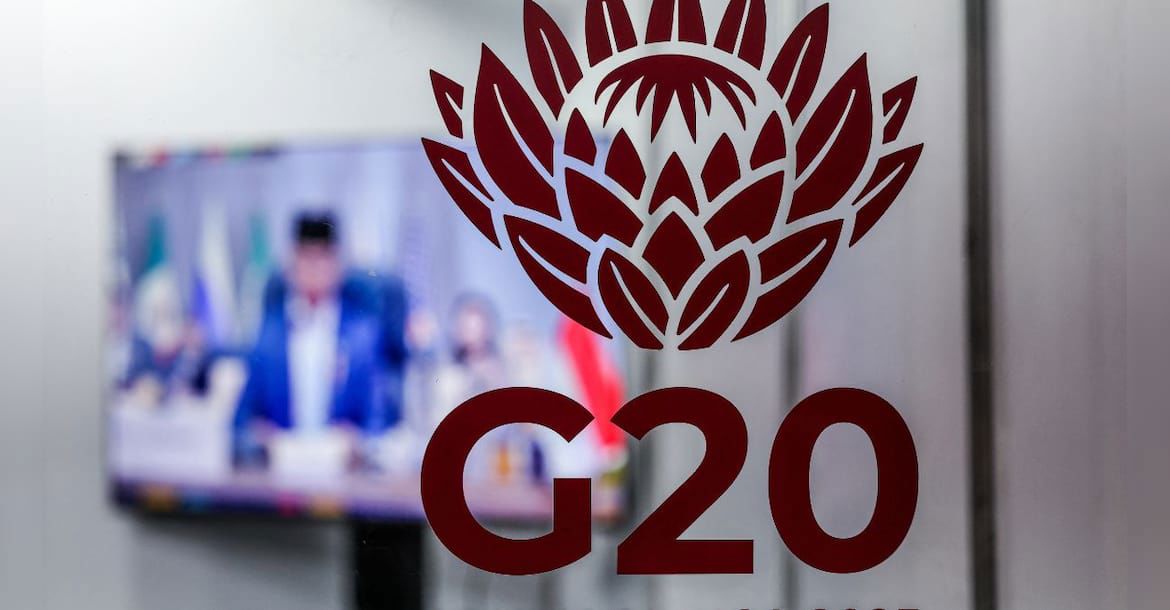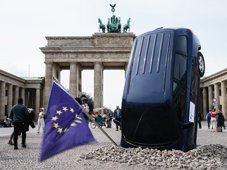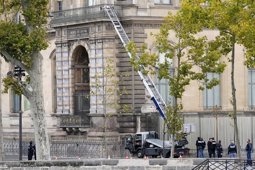
G20 Summit Opens With Early Peace Call for Ukraine, Gaza, Sudan and DRC
G20 leaders opened the summit by issuing an early declaration demanding just, comprehensive and lasting peace across Ukraine, Gaza, Sudan and the DRC. The early declaration elevated the summit’s foreign-policy dimension and linked multiple crises — Ukraine, Gaza, Sudan and the DRC — under a single call for just and lasting peace.
In a joint declaration issued at the outset of the Group of Twenty (G20) summit in Johannesburg on 22 November 2025, the world’s 20 major economies affirmed their commitment to “a just, comprehensive, and lasting peace” in Ukraine, the Gaza Strip, Sudan and the Democratic Republic of the Congo (DRC). The leaders renewed their pledge to abide by international law — including the principles of the United Nations Charter and international humanitarian law — and condemned all attacks against civilians and infrastructure.
Why It Matters
The adoption of the declaration at the beginning of the summit — rather than at the conclusion as is customary — marks a departure from past G20 practice and signals the heightened urgency of global conflict-resolution efforts. Moreover, the declaration gained “an overwhelming consensus” despite (notably) the absence of the United States’ full participation in the declaration process. The recognition that the forum can produce unified statements early in the summit demonstrates a shift in how leaders aim to manage acute geopolitical crises within multilateral settings.
This move matters because the G20, which brings together major developed and emerging economies, has traditionally been seen in economic and financial terms. Yet here it is being leveraged to articulate foreign-policy stances and conflict-resolution priorities. The reference to four active conflict theatres also signals the extent to which the G20 perceives itself as relevant to global security—not only to global economic governance. As the host nation under the 2025 presidency, South Africa sought to position the summit at the intersection of “solidarity, equality and sustainability” and to bring perspectives from the Global South into the heart of the agenda.
The G20 and Conflict Diplomacy
The G20 represents nineteen sovereign states plus the European Union, collectively accounting for more than 80 % of global GDP and roughly two-thirds of the world’s population. According to research, the G20 summit traditionally concludes with a leaders’ declaration after negotiations over the preceding Sherpa and finance tracks.
In recent years, the G20 has increasingly addressed major conflict zones. At the 2024 G20 summit in Rio de Janeiro, for instance, leaders urged a “comprehensive cease-fire” in Gaza and Lebanon and by implication rejected protracted war as a solution, although the wording stopped short of referencing specific actors by name.
Against this background, the Johannesburg declaration appears as a further step: it names specific theatres of conflict — Ukraine, Gaza, Sudan and the DRC — and underscores the notion of peace that is “just, comprehensive and lasting.” It also retains the formula of anchoring the commitment in the UN Charter and international humanitarian law.
Key Elements of the Declaration
- The declaration affirms an “unwavering commitment to act in accordance with international law, including international humanitarian law and the Charter of the United Nations and its principle of peaceful settlement of disputes.”
- It explicitly condemns “all attacks against civilians and infrastructure.”
- The inclusion of Ukraine, Gaza, Sudan and the DRC in the same sentence links conflicts in Europe, the Middle East and Africa as common challenges for multilateral diplomacy.
- The early adoption of the statement “with an overwhelming consensus” suggests a pre-agreed text and strong coordination by the host presidency.
Bilateral Discussions on the Sidelines
On the summit's sidelines, the meeting between Canadian Prime Minister Mark Carney and French President Emmanuel Macron further illustrates the linkage of the peace agenda with broader issues of security and cooperation. According to the Canadian government, the two leaders discussed the crisis in Ukraine and the urgency of stabilising Gaza, with a shared commitment to accelerate reconstruction efforts in the Palestinian territory. The pair also explored bilateral relations and global priorities such as critical minerals, artificial intelligence and energy.
Specifically, Carney committed to working with allies to reach a “just and lasting peace in Ukraine”. On Gaza, both leaders stressed the urgency of bringing stability and the need to accelerate reconstruction to address the ongoing humanitarian crisis. The discussions underscore how G20 gatherings continue to provide space for focused bilateral diplomacy alongside the broader multilateral platform.
Risks & Possible Scenarios
The Johannesburg declaration is a strong statement of intent, but the path to implementation is fraught with challenges. Some of the key risks and potential scenarios include:
Risk: Lack of enforcement mechanism
While the declaration affirms legal norms and condemns attacks on civilians and infrastructure, it lacks binding enforcement provisions. Without follow-through mechanisms, the commitment may remain declaratory.Risk: Divergent interests among G20 members
The G20 includes countries with varying positions on the conflicts named. Variations in strategic interests, economic ties and diplomatic alignments may hinder implementation of a coherent policy track.Scenario: Catalyst for coordinated diplomacy
If the declaration serves as a springboard, the G20 members may mobilise further diplomatic, financial and humanitarian tools to advance peace processes in the named theatres.Scenario: Symbolic outcome only
Alternatively, the statement could end up as a symbolic reaffirmation of existing positions without any tangible new initiatives, particularly if underlying conflicts deepen or leadership attention shifts.Risk: Overshadowing by emerging crises
Global attention is finite. Emergence of new flashpoints or escalating tensions elsewhere might divert the energy and resources required to act on the commitments in Ukraine, Gaza, Sudan and the DRC.Risk: Host-region expectations
With South Africa at the helm of the 2025 presidency, expectations for tangible progress may be higher in the Global South. Failure to deliver could impact the credibility of the G20 presidency and affect future multilateral engagement.
Why did the G20 issue the declaration at the beginning of the summit?
The declaration was adopted at the very beginning of the summit because G20 leaders reached an “overwhelming consensus” on the text in advance. This early adoption signaled urgency and allowed discussions to focus on implementation rather than last-minute negotiations.
What does the G20 peace call include?
The G20 call includes a commitment to pursue “just, comprehensive, and lasting peace” in Ukraine, Gaza, Sudan and the Democratic Republic of the Congo. It also reaffirms adherence to international law, including international humanitarian law, and condemns all attacks against civilians and infrastructure.
How does the G20 declaration affect Ukraine and Gaza?
For Ukraine, the declaration emphasizes achieving a just and lasting peace, aligning with broader diplomatic efforts mentioned in bilateral talks such as the meeting between Prime Minister Mark Carney and President Emmanuel Macron. For Gaza, the declaration underscores the urgency of stabilizing the territory and accelerating reconstruction to address the humanitarian crisis.
What issues did Carney and Macron discuss on the G20 sidelines?
Prime Minister Mark Carney and President Emmanuel Macron discussed efforts to reach a just and lasting peace in Ukraine, the need to stabilize Gaza, and the urgency of reconstruction. They also exchanged views on bilateral relations and global priorities such as critical minerals, artificial intelligence and energy.
What to Expect Next
As the G20 enters the next phase of its presidency under South Africa, the main question for observers will be whether these high-level commitments translate into concrete action. Key areas to watch in the coming weeks and months include:
- Whether G20 member states launch coordinated initiatives (diplomatic, humanitarian or reconstruction-oriented) tied to the theatres named in the declaration.
- Whether summit‐host South Africa uses its presidency to assemble follow-up mechanisms or working groups that carry the commitment into operational steps.
- Whether bilateral and multilateral engagements (such as the Carney-Macron meeting) evolve into concrete partnerships or programmes.
- Whether global crisis fatigue or divergent national interests dilute the effectiveness of the declaration.
In short, the declaration serves as a signal, not a solution — and the next test will be whether the G20 can move beyond words to action.
Sources: Reuters Epthinktank Atalayar






